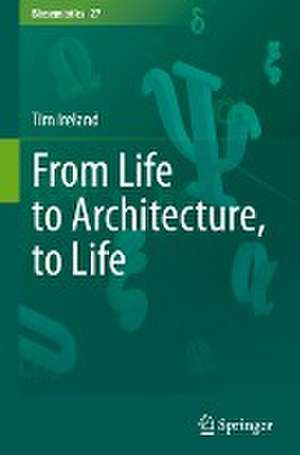From Life to Architecture, to Life: Biosemiotics, cartea 27
Autor Tim Irelanden Limba Engleză Hardback – 19 ian 2024
Din seria Biosemiotics
- 18%
 Preț: 948.92 lei
Preț: 948.92 lei - 15%
 Preț: 640.55 lei
Preț: 640.55 lei - 18%
 Preț: 783.20 lei
Preț: 783.20 lei - 15%
 Preț: 644.30 lei
Preț: 644.30 lei - 15%
 Preț: 583.61 lei
Preț: 583.61 lei - 18%
 Preț: 1559.94 lei
Preț: 1559.94 lei - 15%
 Preț: 647.08 lei
Preț: 647.08 lei - 24%
 Preț: 784.02 lei
Preț: 784.02 lei - 24%
 Preț: 777.07 lei
Preț: 777.07 lei - 18%
 Preț: 1660.18 lei
Preț: 1660.18 lei - 18%
 Preț: 1103.93 lei
Preț: 1103.93 lei - 15%
 Preț: 653.98 lei
Preț: 653.98 lei - 18%
 Preț: 722.43 lei
Preț: 722.43 lei - 18%
 Preț: 1004.48 lei
Preț: 1004.48 lei - 18%
 Preț: 780.82 lei
Preț: 780.82 lei - 24%
 Preț: 643.53 lei
Preț: 643.53 lei - 18%
 Preț: 734.90 lei
Preț: 734.90 lei - 18%
 Preț: 733.15 lei
Preț: 733.15 lei - 15%
 Preț: 638.39 lei
Preț: 638.39 lei - 18%
 Preț: 1845.44 lei
Preț: 1845.44 lei - 18%
 Preț: 941.38 lei
Preț: 941.38 lei - 18%
 Preț: 947.85 lei
Preț: 947.85 lei - 18%
 Preț: 1217.27 lei
Preț: 1217.27 lei - 18%
 Preț: 1661.13 lei
Preț: 1661.13 lei - 18%
 Preț: 1217.86 lei
Preț: 1217.86 lei - 18%
 Preț: 894.46 lei
Preț: 894.46 lei
Preț: 794.07 lei
Preț vechi: 968.38 lei
-18% Nou
Puncte Express: 1191
Preț estimativ în valută:
151.94€ • 159.21$ • 125.61£
151.94€ • 159.21$ • 125.61£
Carte tipărită la comandă
Livrare economică 12-26 aprilie
Preluare comenzi: 021 569.72.76
Specificații
ISBN-13: 9783031459245
ISBN-10: 3031459245
Ilustrații: XXX, 409 p. 122 illus., 73 illus. in color.
Dimensiuni: 155 x 235 mm
Greutate: 0.79 kg
Ediția:1st ed. 2024
Editura: Springer International Publishing
Colecția Springer
Seria Biosemiotics
Locul publicării:Cham, Switzerland
ISBN-10: 3031459245
Ilustrații: XXX, 409 p. 122 illus., 73 illus. in color.
Dimensiuni: 155 x 235 mm
Greutate: 0.79 kg
Ediția:1st ed. 2024
Editura: Springer International Publishing
Colecția Springer
Seria Biosemiotics
Locul publicării:Cham, Switzerland
Cuprins
1. Introduction.- Part 1. Architecture to Biosemiotics.- 2. The Essence of Architectural Creation.- 3. Architecture is like a Language.- Part 2. Biosemiotics to Architecture.- 4. Computing Life and Architecture.- 5. A Biosemiotic Conception of Space.- Part 3. Architecture to Life.- 6. Architecture and Life.
Notă biografică
Tim Ireland is an architect and lecturer of digital architecture at the Sheffield School of Architecture, University of Sheffield, UK. Interested in natural systems and computation his teaching and research focus on biological theory, semiotics and computational design.
Textul de pe ultima copertă
The book establishes a correlation between architectural theory and the biosemiotic project, and suggest how this coupling establishes a framework leading to an architectural-biosemiotic paradigm that puts biosemiotic theory at the heart of cognising the built environment, and offers an approach to understanding and shaping the built environment that supports (and benefits) human, and organismic, spatial intelligence.
Caracteristici
First book to establish a correlation between architectural theory and the biosemiotic project Illustrates how signs may be understood as forces that inform and direct an organism’s engagement with its environment using Jakob von Uexküll’s (1864 - 1944) sign oriented notion of space Sets out to establish a framework for an architectural-biosemiotic paradigm that puts biosemiotic theory at the heart of building an environment that supports (and benefits) human, organismic, and spatial intelligence
